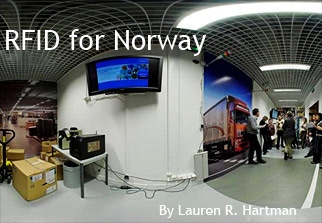RFID to track meat and poultry through the Norwegian food supply chain
February 4, 2014

 IBM and Matiq, the information technology subsidiary of Nortura—Norway’s largest food supplier—are collaborating on a project that will use Radio Frequency Identification (RFID) technology to track and trace poultry and meats from the farm, through the supply chain, to the supermarket. IBM and Matiq are developing the food-tracking solution—presumably the first of its kind in the Nordics--to help ensure that meat and poultry products are kept in optimal condition throughout the supply chain.
IBM and Matiq, the information technology subsidiary of Nortura—Norway’s largest food supplier—are collaborating on a project that will use Radio Frequency Identification (RFID) technology to track and trace poultry and meats from the farm, through the supply chain, to the supermarket. IBM and Matiq are developing the food-tracking solution—presumably the first of its kind in the Nordics--to help ensure that meat and poultry products are kept in optimal condition throughout the supply chain.
The announcement comes as the food manufacturing industry is facing some of the most challenging market conditions in its history. Consumer pressure, government regulations, and industry requirements for quality and traceability mean that producers are under pressure to provide more detail on products. With foods being sourced across international borders, consumers are demanding to know more about the products they buy and growing and storage the conditions as they travelled from farm to dinner table.
IBM and Matiq will develop and manage the technology infrastructure needed to enable the track-and-trace system for the Norwegian food market. Packaging will be tagged with RFID chips to help ensure that products are kept in optimal conditions throughout the supply chain. Norwegian suppliers and supermarkets using software that complies with GS1 EPCglobal’s Electronic Product Code Information Services (EPCIS) standard, which allows sharing of RFID data across and between enterprises, can monitor and analyze their entire value chain, increasing efficiency and reducing costs.
For retailers there, the information will make it easier to track products and avoid out of stocks. It will also help manufacturers and supermarkets to improve the responsiveness of the supply chain to quickly adapt to changing consumer buying patterns.
“IBM was one of the key players involved in creating the EPCIS standards upon which the success of this project relies,” said Are Bergquist, CEO of Matiq. “We are therefore confident that IBM has the right technology and expertise for this project. “Consumers are becoming increasingly aware of food quality, safety, origin and traceability. This creates greater pressure on manufacturers to keep track of every component in the manufacturing process, in order to ensure that their products are safe for the consumer. IBM and Matiq are developing solutions that will help ensure food safety on the consumer’s terms,” he says.
The heart of the system is IBM’s WebSphere RFID Information Center software, designed for enterprises seeking to share product movement information with trading partners who are also using EPCIS compliant solutions.
Specialists from IBM Global Technology Services unit will implement the end-to-end infrastructure solution for Matiq, and IBM experts on sensors and RFID will work with Matiq to develop this first of a kind solution.
“The integration of infrastructure and food-tracing solutions is complex and challenging," says Morten Thorkildsen, country General Manager for IBM Norway. IBM is helping market leaders like Matiq remain at the forefront of the retail industry by employing RFID in their entire IT infrastructure, which enable new ways of doing business and at the same time delighting customers. This agreement is proof of how IBM's RFID solutions improve efficiencies for our clients while building customer loyalty in the store,” he said.
With foods being sourced across international borders, consumers want to know more about the products they buy and the conditions under which they were grown and stored as they travel from the farm to their dinner table. These consumer demands--along with new government regulations and industry requirements for quality and traceability—are prompting food suppliers to provide more details on packaging.
The new system, based on IMB’s WebSphere RFID Information Center software, will help ensure that meat and poultry are kept in optimal condition throughout the supply chain. The system complies with GS1 EPCglobal’s Electronic Product Code Information Services (EPCIS) standard, which allows sharing of RFID data across and between enterprises.
Using this system, Norwegian suppliers and supermarkets using EPCIS-compliant software, will be able to monitor and analyze their entire value chain, increasing efficiency and reducing costs. Matiq says that it’s developing the new system with the help of IBM experts on sensors and RFID. The system will be deployed by specialists from the IBM's Global Technology Services unit.
Previous Article
Sales of box wines growing significantly, says A.C. Nielsen
.
About the Author(s)
You May Also Like


